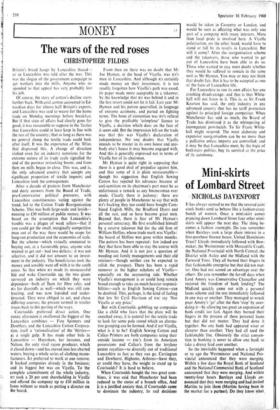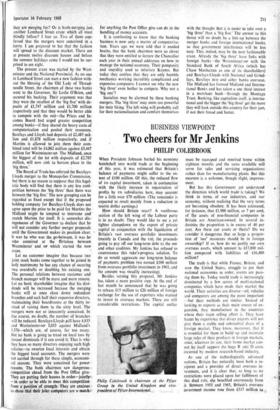of Lombard Street Mini-skirts
NICHOLAS DAVENPORT
It has always seemed to me that the revered joint stock banks tend to behave like a fashion-crazy bunch of women. Once a mini-skirt comes prancing down Lombard Street four other mini- skirts will appear the next day. The thing be- comes a fashion overnight. Do you remember when Barclays took a large share interest in a hire-purchase finance house, United Dominions Trust? Lloyds immediately followed with Bow- maker, the Westminster with Mercantile Credit, the National Provincial with North Central, the District with Astley and the Midland with the Forward Trust. They all burned their fingers in that fashionable enterprise but that did not mat- ter. One had not scored an advantage over the others. Do you remember the far-off days when Lord Amory was Conservative Chancellor and restored the freedom of bank lending? The Midland quickly came out with a personal loans scheme and the rest immediately followed in one way or another. They managed to wreck poor Amory's 'go' after the then 'stop' by over- doing it—by allowing too great an expansion of bank credit too fast. Again they burned their fingers in the process of these personal loans but that did not matter. They had done it together. No one bank had appeared wiser or cleverer than- another. They had all toed the fashionable line. Obviously the strict conven- tion in banking is never to allow one bank to take a dressy lead over another.
So the inevitable happened when a fortnight or so ago the Westminster and National Pro- vincial announced that they were merging. Within a few days the Royal Bank of Scotland and the National Commercial Bank of Scotland announced that they were merging. And within twenty-four hours Barclays and Lloyds an- nounced that they were merging and had invited Martins to join theni (Martins having been in the market for a wilier). Do they know what,
they are merging for? Or is bank-merging just another Lombard Street craze which all must blindly follow? I fear so. Two of them cqp- fessed that the mergers were conceived in a hurry. I am prepared to bet that the fashion will spread to the discount market. There are at present twelve discount houses and before the summer holidays come I would not be sur- prised to see eight.
The present craze was started by the West- minster and the National Provincial. As no one in Lombard Street can start a new fashion with- out the blessing of the Old Lady of Thread- needle Street, the chairmen of these two banks went to the Governor, Sir Leslie O'Brien, and secured his backing. Their, argument was that they were the smallest of the `big five' with de- posits of £1,747 million and £1,700 million respectively and that they would be better able to compete with the rest—the Prices and In- comes Board had urged greater, competition among banks—if they shared the heavy costs-of computerisation and pooled their resources. Barclays and Lloyds had deposits of £2,485 mil- lion and £1,878 million respectively, and Martins is allowed to join them their com- bined total will be £4,862 million against £3,447 million for Westminster-NP. The Midland, once the biggest of the lot with deposits of £2,785 million, will now sink to bottom place in the `big three.'
The Board of Trade has referred the Barclays- Lloyds merger to the Monopolies Commission, but there is no reason to suppose that this legal- istic body will find that there is any less con{- petition between the `big three' than there was between the `big five.' The new grouping can be regarded as fixed except that if the proposed holding company for Barclays-Lloyds does not agree upon the price to be paid for Martins the - Midland might be tempted to intervene and' snatch Martins for itself. Jr is somewhat dis-.
ingenuous of the Governor, to declare that he will not consider any further merger proposals until the Government makes its position clear. It was he who was the go-between, it was he who connived at the flirtation between Westminster- and NP which started the new craze.
Let no customer imagine that because two- joint stock banks come together to be joined in holy matrimony he has any chance of securing
two overdrafts or doubling his existing one. The personal relations between customer and branch manager will be more and more remote. Let no bank shareholder imagine that his divi- dends will be increased because the merging,
banks will at once close down redundant branches arid sack half their expensive directors, maintaining their boardrooms at the thirty in- stead of raising them to the sixty level. The mergers were not so innocently conceived. In due course, no doubt, the number of branches will be reduced. Barclays-Lloyds will have 4,835 and Westminster-NP 3,033 against Midland's 3,376—which are, of course, far too many.
But no bank is going to tread on local toes by instant dismissals if it can avoid it. That is why they have so many directors enjoying such high.
salaries—to sweeten local interests and obtain the biggest local accounts. The mergers were
not carried through for these simple, economi- cal reasons. They were conceived for power reasons. The bank chairmen saw dangerous , competition ahead from the Post Office giro. They are putting their houses in order—joiner.: —in -order to be able to meet this competition from a- position of strength: They are anxious - to show' thai their joint cothputers are a match.:
for anything the Post Office giro can do in the handling of money accounts.
It is comforting to know that the banking business is now only a matter of computerisa- tion. Years ago we were told that it needed brains, that the bank chairmen were so clever that they were entitled to lecture the Chancellor each year in their annual addresses on how to manage the national economy. Their pomposity and stupidity used to infuriate Keynes. But today they confess that they are only humble mechanics working incredibly complicated and expensive computers. I cannot see why the new `big three' even bother to compete. Why not a `big one'?
Socialists may be alarmed by these banking mergers. The `big three' may seem too powerful for their liking. The left wing will probably call for their nationalisation and comfort themselves
with the thought that it is easier to take over a `big three' than a `big five.' The answer to this threat will no doubt be a link-up between the merger banks and foreign international banks, so that government interference will be less easy. This, indeed, may be the next fashionable craze. Already the `big three' have links with foreign banks—the Westminster-NP with the Standard Bank of South- Africa (which has Chase Manhattan as one of its shareholders) and Barclays-Lloyds with National and Grind- lays, Barclays DCO and other banks overseas. The Midland has formed Midland and Interna- tional Banks and has taken a one third interest in a merchant bank—through the Montagu Trust. Banking, like capitalism itself, is interna- tional and the bigger the 'big three' get the more they will look outside this country for their jam, if not their bread and butter.



































 Previous page
Previous page